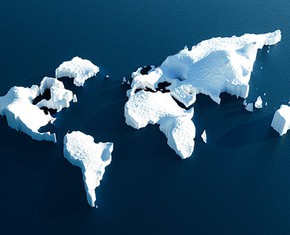The views expressed in our content reflect individual perspectives and do not represent the authoritative views of the Baha'i Faith.
How do Baha’is approach the thorny, complex and difficult issue of climate change?
Scientific concepts of ecology, environmental responsibility and evolutionary social change have deep roots in the Baha’i teachings (BWC 1990). The Baha’i International Community has been active on environmental issues at the United Nations and elsewhere for several decades (Dahl 2005). Baha’is all over the world will take part in Earth Day observances this week—but the Baha’i approach to climate change operates from a much wider perspective than merely dedicating a day to remembering our planet. In fact, the global Baha’i community approaches climate change from a revolutionary perspective—one that begins with the human spirit.
 For Baha’is, science and religion fundamentally harmonize, providing complementary perspectives on the same basic truths. Just as religion without science and reason can descend into superstition, so does science without religion tend towards materialism and destruction of the natural environment.
For Baha’is, science and religion fundamentally harmonize, providing complementary perspectives on the same basic truths. Just as religion without science and reason can descend into superstition, so does science without religion tend towards materialism and destruction of the natural environment.
That principle of the harmony of science and religion means the Baha’i approach combines a scientific perspective on climate change with solutions that address the resulting ethical and spiritual challenges, as well. It goes beyond advocacy to question the dominant materialist society and consumer culture, by emphasizing the necessary balance of the material and spiritual dimensions of human life. By teaching contentment with little, and the need to eliminate the extremes of wealth and poverty often associated with excessive greenhouse gas emissions (the former through over consumption, the latter through deforestation and soil degradation), the Baha’i teachings encourage a wholesale reconsideration of our lifestyles and consumption patterns:
Take from this world only to the measure of your needs, and forego that which exceedeth them. Observe equity in all your judgements, and transgress not the bounds of justice, nor be of them that stray from its path. – Baha’u’llah, The Summons of the Lord of Hosts, p. 194.
At the social level, the Baha’i approach focuses on the unity of the human race founded on justice and solidarity. It explores the spiritual principles upon which any solution to the climate change problem and the larger challenges facing society must be based, and incites individual reflection, personal responsibility, community action and world citizenship.
For a complex issue such as climate change, where costs and benefits, immediate advantages and long-term risks are so unequally distributed, justice and equity will prove essential in achieving any global collective action. As the Baha’i International Community has put it in the context of development:
Concern for justice protects the task of defining progress from the temptation to sacrifice the well-being of the generality of humankind—and even of the planet itself—to the advantages which technological breakthroughs can make available to privileged minorities …. Above all, only development programmes that are perceived as meeting their needs and as being just and equitable in objective can hope to engage the commitment of the masses of humanity, upon whom implementation depends. The relevant human qualities such as honesty, a willingness to work, and a spirit of co-operation are successfully harnessed to the accomplishment of enormously demanding collective goals when every member of society—indeed every component group within society—can trust that they are protected by standards and assured of benefits that apply equally to all. – The Baha’i International Community, The Prosperity of Humankind, 1995.
Even though the world’s nations have now signed a universal agreement to reduce carbon emissions and mitigate the worst effects of climate change, we have not put in place any worldwide mechanism to enforce that treaty. The present difficulty in enforcing global standards for greenhouse gas reductions arises in part because governments are still more concerned about defending their short-term economic interests, rather than justly and equitably distributing both the efforts required and the accruing benefits. The Baha’i teachings speak out strongly against world leaders who would frustrate human progress toward the justice, peace and unity that will ensure environmental sustainability.
Baha’is have a strong vision of a future global society, and see climate change as an important force compelling the nations and peoples of the world to give priority to their common interest. The Baha’i writings include scenarios of an ever-advancing global civilization that can result from a principle-based approach to world challenges like climate change, with a federated world government able to maintain collective security, to manage the planet’s vast resources and to distribute its products equitably. These unique, revolutionary perspectives of the long-term future of the human race provide a positive focus to counterbalance the negative concerns for our immediate future that the scientific facts of climate change demonstrate all too clearly.
Given this background, the Baha’i International Community (BIC) has actively engaged in the climate change debate. As just one of many, many examples, at the 15th UN Commission on Sustainable Development in New York in 2007, the BIC organized a popular side event in the UN building on the Ethical Dimensions of Climate Change, in partnership with the Missions of the Marshall Islands and Tuvalu, the UN, the Rock Ethics Institute at Penn State University, the International Environment Forum, and other NGOs. An essay on this topic was published in The Baha’i World 2005-2006, the public record of the Baha’i community’s activities.
Baha’i communities in every part of the world have taken up the call to battle climate change at its most basic level, by carrying Baha’u’llah’s message of the essential agreement of science and religion to every part of the planet.
You May Also Like
Comments

















"the global Baha’i community approaches climate change from a revolutionary perspective—one that begins with the human spirit."
The German agencies for development have reached a milestone in their understanding of themselves and the role of religion in this fields (as ~80% of humanity is religiously inspired). They have now grasp that religion has the ability to touch on the deepest fibers of human motivation, thus accompanied by the principles of the harmony of Science and Religion as two complementary systems of knowledge -which explore both the material and spiritual dimensions- is of paramount importance.